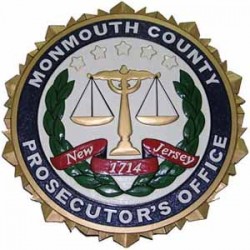 Monmouth County’s Assistant Prosecutor Mark Apostolou Jr. came to the University as a guest speaker on Tuesday, March 20. Apostolou came into Dr. Gregroy Boredelon’s Pre-Trial Prosecution System class on Tuesday nights. He came in to give the students in the class a practical use for the theory they are learning now in class. Apostolou attended the University of Richmond for his undergraduate degree, and then went to Seton Hall Law School. Following law school, he did a one year clerkship and in September of 2007 he was named Assistant Prosecutor of Monmouth County.
Monmouth County’s Assistant Prosecutor Mark Apostolou Jr. came to the University as a guest speaker on Tuesday, March 20. Apostolou came into Dr. Gregroy Boredelon’s Pre-Trial Prosecution System class on Tuesday nights. He came in to give the students in the class a practical use for the theory they are learning now in class. Apostolou attended the University of Richmond for his undergraduate degree, and then went to Seton Hall Law School. Following law school, he did a one year clerkship and in September of 2007 he was named Assistant Prosecutor of Monmouth County.
His topic of discussion was how pretrial decisions played a role everyday especially during his job. Apostolou discussed in detail all the work that goes into a case prior to trial. He explained how warrants work, and arraignment of a suspect. He spent a large amount of time on how discovery can make or break a case. According to legaldefinitions.com, discovery “Allows one party to question other parties, and sometimes witnesses. It also allows one party to force the others to produce requested documents or other physical evidence.” Discovery gives everyone all the information involved in a case and makes it fair for the attorneys.
The other main objective of his appearance was about the important of a grand jury. According to uscourts.gov, a “Grand jury, which normally consists of 16 to 23 members, has a more specialized function. The United States attorney, the prosecutor in federal criminal cases, presents evidence to the grand jury for them to determine whether there is “probable cause” to believe that an individual has committed a crime and should be put on trial. If the grand jury decides there is enough evidence, it will issue an indictment against the defendant. Grand jury proceedings are not open for public observation.” Apostolou explained how this part of the process can make or break a case.
His final topic of discussion was about suppression of evidence. Suppression of evidence occurs “1) a judge’s determination not to allow evidence to be admitted in a criminal trial because it was illegally obtained or was discovered due to an illegal search, 2) the improper hiding of evidence by a prosecutor who is constitutionally required to reveal to the defense all evidence. Such suppression is a violation of the due process clause (5th Amendment, applied to states by the 14th Amendment) and may result in dismissal, mistrial or reversal on appeal, as well as contempt of court for the prosecutor,” according to legaldictionary. com. If evidence is suppressed it can ultimately destroy a case. Apostolou explained how important it is to make sure everything is done carefully and by the books so that suppression does not occur. He used two examples, both being New Jersey cases.
The most recent one, New Jersey v. Best involved a warrantless search of a vehicle owned by a student in the school’s parking lot and whether the school had the right to search it. Eventually it was upheld that the search was conducted the correct way because the Constitution protects against the government or law enforcement conducting an illegal search. In this case it was done by a school, not the government.
Apostolou’s visit took the regular classroom experience and turned it into something very real and concrete. “I hope they got a sense of how the theory they are studying applies on an everyday level and how it works in the court systems of New Jersey,” said Apostolou. Boredelon was also excited about the impression Apostolou had on his class. “I think it was great. I believe a goal of all educators is to most directly show students the real world implications of the content covered in class. Having someone who is ‘in the trenches’ to come and give a real-life canvass to the theory we discuss is class was fantastic.”
The students in attendance were impressed with Apostolou’s presentation. Jason Puchalslof, a senior political science major, said, “His knowledge of the legal system was the most impressive part of his presentation.” Rich Corfing, a political science major, was also impressed with his knowledge. H “I took away that these things mentioned in class may be real world problems that we, one day, may encounter,” said Corfing.
The students of the University also made an impression on Apostolou. When asked about giving advice to those thinking of attending law school he said, “It does require a lot of hard work but it can be rewarding if you are very passionate about it.” Bordelon echoes that view by saying he hopes his students understand, “That studying and doing well in college does lead to both positive job prospects as well as knowledge you’ll use in your career.”
When Puchalslof and Corfing were asked if having speakers like this helped, they both agreed. Puchalslof stated, “Bringing more informative speakers in allows the students to get important questions answered regarding future career
IMAGE TAKEN from www.masterplaques.co


